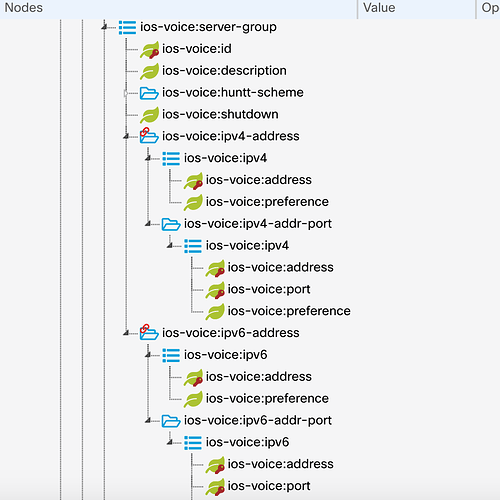gunjang
November 20, 2020, 9:31am
1
I have a requirement where I have below config:
voice class server-group 232
ipv4 2.3.4.5
ipv4 10.98.77.6 port 2234
voice class server-group 212
ipv4 2.3.4.1 preference 1
ipv4 8.43.33.21 preference 3
ipv4 10.64.86.70 port 2234
ipv6 2001:420:54FF:13::666:12
ipv6 2001:420:54FF:13::666:11 port 22341 preference 2
I want to restrict max 5 address per server-group. Each server-group has total 4 lists - ipv4, ipv4+port, ipv6, ipv6+port.
I have tried below must condition -
must "(
count(
/ios:native/ios-voice:voice/ios-voice:class/ios-voice:server-group[ios-voice:id=current()] \
/ios-voice:ipv4-address/ios-voice:ipv4/ios-voice:address
)
+ count(
/ios:native/ios-voice:voice/ios-voice:class/ios-voice:server-group[ios-voice:id=current()] \
/ios-voice:ipv4-address/ios-voice:ipv4-addr-port/ios-voice:ipv4/ios-voice:address
)
+ count(/ios:native/ios-voice:voice/ios-voice:class/ios-voice:server-group[ios-voice:id=current()] \
/ios-voice:ipv6-address/ios-voice:ipv6/ios-voice:address)
+ count(
/ios:native/ios-voice:voice/ios-voice:class/ios-voice:server-group[ios-voice:id=current()] \
/ios-voice:ipv6-address/ios-voice:ipv6-addr-port/ios-voice:ipv6/ios-voice:address)
)
<= 5
"
{
error-message "Maximum 5 destination entries allowed";
}
This didnt help. If i remove “current” then this condition checks for all the addresses configured (irrespective of any server-group).
Can someone suggest a way to get rid of this ?
Your help will be highly appreciated.
nabil
November 20, 2020, 6:40pm
2
Hi gunjang, Welcome to the community:
gunjang
November 21, 2020, 4:28pm
3
Changes are little more please find it below :https://polaris-git.cisco.com/csg/polaris/pull/70835/files
grouping config-voice-class-server-group-grouping {
list server-group {
description
"IP Server Group";
tailf:cli-mode-name "config-class";
max-elements 10000;
key id;
leaf id {
description
"Voice class server group tag";
tailf:cli-full-no;
tailf:cli-full-command;
tailf:cli-suppress-range;
type uint16 {
range "1..10000";
}
}
container ipv4-address {
tailf:cli-drop-node-name;
must "(count(/ios:native/ios-voice:voice/ios-voice:class/ios-voice:server-group[ios-voice:id=current()] /ios-voice:ipv4-address/ios-voice:ipv4/ios-voice:address) + count(/ios:native/ios-voice:voice/ios-voice:class/ios-voice:server-group[ios-voice:id=current()]/ios-voice:ipv4-address/ios-voice:ipv4-addr-port/ios-voice:ipv4/ios-voice:address)+ count(/ios:native/ios-voice:voice/ios-voice:class/ios-voice:server-group[ios-voice:id=current()] /ios-voice:ipv6-address/ios-voice:ipv6/ios-voice:address)+ count(/ios:native/ios-voice:voice/ios-voice:class/ios-voice:server-group[ios-voice:id=current()] /ios-voice:ipv6-address/ios-voice:ipv6-addr-port/ios-voice:ipv6/ios-voice:address)) <= 5" {
error-message "Maximum 5 destination entries allowed";
}
list ipv4 {
tailf:cli-suppress-mode;
tailf:cli-compact-syntax;
max-elements 5;
key "address";
leaf address {
tailf:cli-drop-node-name;
tailf:cli-full-no;
description
"set the Call Manager configuration download TFTP server address/name";
tailf:cli-suppress-range;
type inet:ipv4-address;
}
leaf preference {
description
"Preference order of this server in a group";
tailf:cli-optional-in-sequence;
type uint8 {
range "0..5";
}
}
}
container ipv4-addr-port {
tailf:cli-drop-node-name;
list ipv4 {
tailf:cli-suppress-mode;
tailf:cli-compact-syntax;
max-elements 5;
key "address port";
leaf address {
tailf:cli-drop-node-name;
tailf:cli-suppress-range;
description
"set the Call Manager configuration download TFTP server address/name";
type inet:ipv4-address;
}
leaf port {
description
"IP Address Port";
tailf:cli-expose-key-name;
tailf:cli-full-no;
tailf:cli-suppress-range;
type uint16 {
range "1..65535";
}
}
leaf preference {
description
"Preference order of this server in a group";
tailf:cli-optional-in-sequence;
type uint8 {
range "0..5";
}
}
}
}
}
container ipv6-address {
tailf:cli-drop-node-name;
must "(count(/ios:native/ios-voice:voice/ios-voice:class/ios-voice:server-group[ios-voice:id=current()] /ios-voice:ipv4-address/ios-voice:ipv4/ios-voice:address) + count(/ios:native/ios-voice:voice/ios-voice:class/ios-voice:server-group[ios-voice:id=current()]/ios-voice:ipv4-address/ios-voice:ipv4-addr-port/ios-voice:ipv4/ios-voice:address)+ count(/ios:native/ios-voice:voice/ios-voice:class/ios-voice:server-group[ios-voice:id=current()] /ios-voice:ipv6-address/ios-voice:ipv6/ios-voice:address)+ count(/ios:native/ios-voice:voice/ios-voice:class/ios-voice:server-group[ios-voice:id=current()] /ios-voice:ipv6-address/ios-voice:ipv6-addr-port/ios-voice:ipv6/ios-voice:address)) <= 5" {
error-message "Maximum 5 destination entries allowed";
}
list ipv6 {
tailf:cli-suppress-mode;
tailf:cli-compact-syntax;
max-elements 5;
key "address";
leaf address {
tailf:cli-drop-node-name;
tailf:cli-full-no;
description
"set the Call Manager configuration download TFTP server address/name";
tailf:cli-suppress-range;
type inet:ipv6-address;
}
leaf preference {
description
"Preference order of this server in a group";
tailf:cli-optional-in-sequence;
type uint8 {
range "0..5";
}
}
}
container ipv6-addr-port {
tailf:cli-drop-node-name;
list ipv6 {
tailf:cli-suppress-mode;
tailf:cli-compact-syntax;
max-elements 5;
key "address port";
leaf address {
tailf:cli-drop-node-name;
description
"set the Call Manager configuration download TFTP server address/name";
tailf:cli-suppress-range;
type inet:ipv6-address;
}
leaf port {
description
"IP Address Port";
tailf:cli-expose-key-name;
tailf:cli-full-no;
tailf:cli-suppress-range;
type uint16 {
range "1..65535";
}
}
leaf preference {
description
"Preference order of this server in a group";
tailf:cli-optional-in-sequence;
type uint8 {
range "0..5";
}
}
}
}
}
mvf
November 23, 2020, 10:17am
4
Since your must statement affects whole server-group entry, it’s best to place it right under list server-group; then, there is no need to use absolute paths, everything is at or below the current level; and finally, you do not have to use prefixes if the node you are referring to comes from the current module. So the must expression (and a bit of a context) might look something like this:
list server-group {
must "count(ipv4-address/ipv4) + count(ipv4-address/ipv4-addr-port/ipv4)"
+ "+count(ipv6-address/ipv6) + count(ipv6-address/ipv6-addr-port/ipv6) <= 5" {
error-message "Maximum 5 destination entries allowed";
}
container ipv4-address {
...
}
container ipv6-address {
...
}
}
But note that such must statement might have considerable performance impact, especially if you have large number of server-group or individual address instances.
gunjang
November 25, 2020, 1:23pm
5
Thanks. This actually worked.
mvf
November 25, 2020, 1:32pm
6
Good! But as I wrote, watch the performance.
